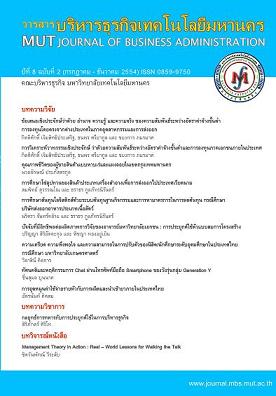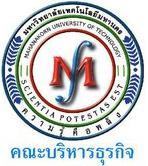ข้อเสนอเชิงประจักษ์ว่าด้วย อำนาจ ความรู้ และความจริง ของความสัมพันธ์ระหว่างอัตราค่าจ้างขั้นต่ำ การลงทุนโดยตรงจากต่างประเทศในภาคอุตสาหกรรมและการส่งออก
Keywords:
การวิเคราะห์วาทกรรมเชิงประจักษ์, อัตราค่าจ้างขั้นต่ำ, การลงทุนโดยตรงจากต่างประเทศในภาคอุตสาหกรรม, การส่งออก, Empirical Discourse Analysis, Minimum Wages, Foreign Direct Investment in Industrial Sector, ExportAbstract
การวิจัยครั้งนี้ มีวัตถุประสงค์เพื่อชี้ให้เห็นถึง ความสัมพันธ์ระหว่าง อัตราค่าจ้างขั้นต่ำ การลงทุนโดยตรงจากต่างประเทศในภาคอุตสาหกรรม และการส่งออก ซึ่งกำลังถูกวิพากษ์วิจารณ์อย่างรุนแรง โดยผู้มีอำนาจหน้าที่ จากทั้งภาครัฐและภาคเอกชน นับตั้งแต่การประกาศนโยบายประกันรายได้อัตราค่าจ้างขั้นต่ำของผู้ใช้แรงงานอยู่ที่ 300 บาทต่อวัน ของพรรคเพื่อไทย ด้วยวิธีวิทยาเชิงปริมาณขั้นสูงโดยนำ ข้อมูลอนุกรมเวลาของ อัตราค่าจ้างขั้นต่ำ การลงทุนโดยตรงจากต่างประเทศในภาคอุตสาหกรรม และการส่งออก มาวิเคราะห์ด้วยสถิติขั้นสูง การวิเคราะห์ถดถอย การทดสอบความสัมพันธ์เชิงดุลยภาพในระยะยาวด้วยวิธีของโจฮานเซน และการทดสอบความเป็นเหตุเป็นผลรายคู่ด้วยวิธีของแกรนเจอร์ผลการวิเคราะห์ด้วยการวิเคราะห์ถดถอย พบว่า อัตราค่าจ้างขั้นต่ำมีความสัมพันธ์ในทิศทางเดียวกัน ทั้งกับการลงทุนโดยตรงจากต่างประเทศในภาคอุตสาหกรรม และการส่งออก ขณะที่การทดสอบความสัมพันธ์เชิงดุลยภาพในระยะยาวด้วยวิธีของโจฮานเซน อัตราค่าจ้างขั้นต่ำ กลับไม่มีความสัมพันธ์กับการลงทุนโดยตรงจากต่างประเทศในภาคอุตสาหกรรม แต่มีความสัมพันธ์กับการส่งออก ในลักษณะเป็นเหตุเป็นผลซึ่งกันและกัน ตามผลการทดสอบความเป็นเหตุเป็นผลรายคู่ด้วยวิธีของแกรนเจอร์
ชี้ให้เห็นว่า การกล่าวอ้างว่าการขึ้นของอัตราค่าจ้างขั้นต่ำจะกระทบต่อความสามารถในการแข่งขันของประเทศ ด้านการลงทุนโดยตรงจากต่างประเทศในภาคอุตสาหกรรม และการส่งออก ภายใต้สถานะของผู้มีอำนาจหน้าที่ และยึดกุมการประกอบสร้างความรู้ รวมถึงความจริงครอบงำสังคม นี่จึงอาจมิใช่การบกพร่องโดยสุจริต แต่เป็นความพยายามหนึ่งของการต่อสู้เชิงวาทกรรม ว่าด้วยความไม่เป็นธรรมทางเศรษฐกิจ และการกดขี่ทางชนชั้น อันเป็นรากเหง้าของปัญหาเชิงโครงสร้างที่สำคัญของประเทศไทย
An Empirical Proposal on Power, Knowledge and Truth of Correlations among the Minimum Wages, Foreign Direct Investment in the Industrial Sector and Export
This research has an objective to demonstrate the correlations among the minimum wage, foreign direct investment in the industrial sector, and export, which has been criticized severely by the authorities from both the public and private sectors, since the Pua Thai Party’s policy announcement on the guarantee of labors’ minimum wage at 300 baht per day. The research employs an advanced quantitative methodology, analyzing time-series data of the minimum wage, foreign direct investment in the industrial sector, and export by advanced statistical methods, regression, the Johansen Cointegration Test, and the Pairwise Granger Causality Test.
The regression analysis reveals that the minimum wage correlates in the same direction with both foreign direct investment in the industrial sector and export, whereas when applied the Johansen Cointegration Test, the minimum wage has no Cointegration with foreign direct investment but has a causal relationship with export according to the Pairwise Granger Causality Test.
This indicates that the claim that the minimum wage increase will affect the competiveness of the country with regard to foreign direct investment in the industrial sector and export, has been reinforced by the authorities using their superior status to dominate the process of building a body of knowledge as well as to distort the truth so as to possess a control over the society. This is thus not a good-faith mistake but an effort of discourse fights on the economic unfairness and social-class discrimination, which is the root of Thailand’s important structural problems.
Downloads
Issue
Section
License
ข้อความ ข้อคิดเห็น ข้อมูล เนื้อหา รูปภาพ แผนภูมิ แผนผัง เป็นต้น ที่ปรากฏและแสดงในบทความต่างๆ ในวารสารบริหารธุรกิจเทคโนโลยีมหานคร ถือเป็นความรับผิดชอบโดยตรงของผู้เขียนบทความนั้นๆ มิใช่เป็นความรับผิดชอบใดๆ ของวารสารบริหารธุรกิจเทคโนโลยีมหานคร และมหาวิทยาลัยเทคโนโลยีมหานคร
บทความที่ตีพิมพ์ในวารสารบริหารธุรกิจเทคโนโลยีมหานคร ถือเป็นลิขสิทธิ์เฉพาะของคณะบริหารธุรกิจ มหาวิทยาลัยเทคโนโลยีมหานคร หากบุคคลหรือหน่วยงานใดต้องการนำทั้งหมดหรือส่วนใดส่วนหนึ่งไปเผยแพร่ต่อหรือเพื่อกระทำการใดๆ จะต้องได้รับการอนุญาตเป็นลายลักษณ์อักษรจากคณะบริหารธุรกิจ มหาวิทยาลัยเทคโนโลยีมหานครก่อนเท่านั้น


